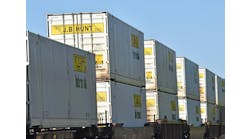When you tender a load to move by air, there's a one in 10 chance it won't fly according to plan. In some cases, the number could be significantly higher.
The challenge has been laid at the feet of the forwarder/carrier community. Can a whole industry change to meet the demands of its customers?
Pressed on all sides, air carriers and forwarders must respond positively to demands for lower costs, higher levels of security, more data integration, better visibility for shipments, greater accuracy in documentation, and a host of other market-driven and governmentmandated initiatives.
Shippers are clear about what's needed. Responding to a recent global survey by market analyst firm Transport Intelligence, shippers say reliability is their top concern. Regardless of whether they are European, U.S.-based or Asian shippers, respondents say proactive notification of problems with their shipments is critical, and, they say, forwarders and carriers aren't doing an adequate job in this area.
The disruption of British Airways (BA) flights at London's Heathrow airport in August offers a powerful example of what can go wrong. British Airways' ground workers struck in sympathy with workers sacked by BA's contract caterer, Gate Gourmet. The BA walkout halted flights, including freighter operations.
BA didn't have sufficient indications that a walkout could occur, so it was unable to warn customers, according to forwarder Mick Baker with AMI (part of Menzies Aviation Group). It was a "relatively difficult weekend," says Baker, but by Monday, operations were returning to normal.
AMI quickly identified affected shipments and rerouted and diverted them away from BA during the disruption. By the following week, Baker was shifting back to BA roughly in line with volumes he had booked prior to the disruption.
Baker explains that cargo the forwarder was handling was pre-booked by customers who automatically receive a booking confirmation by e-mail or FAX. The confirmation contains all the information relevant to that shipment, he continues,including flight details. As AMI identified consignments it had on British Airways and rebooked them, notifications went out to shippers.
"We're a reactive business as well as a proactive business," says Baker. "From that point of view, we're well versed in being able to accommodate short-term problems as part of our business."
"The airline should have anticipated the action of its catering supplier, the resulting strike and the possibility of sympathy strikes," says Yossi Sheffi, director of the MIT Center for Transportation and Logistics. He points to the contingency plans Northwest Airlines worked up in anticipation of the strike by the Aircraft Mechanics Fraternal Association union.
To keep its fleet in the air, Northwest hired mechanics with experience at other airlines, and outsourced maintenance requirements to outside vendors. The airline also reportedly trained replacement flight attendants in the event its flight attendants refused to cross picket lines of striking mechanics.
According to the Wall Street Journal, various reports indicate that on-time performance at Northwest fell to below 50% on the first weekend of the strike; typical on-time performance for all major airlines this summer was 75%.
Although Northwest's pilots and flight attendants elected to cross the picket line and continue flying, the Independent Pilots Association, representing UPS' pilots, announced its members would not handle freight that might be diverted from Northwest as a result of the strike.
Logistics networks have proven their resiliency time and again during extraordinary circumstances. Often only those closest to the situation are aware of the controlled chaos that represents the unified response to a problem. It is the day-to-day consistency that shippers say is lacking.
The one-in-10 air shipments that don't move according to plan represent current figures from Cargo 2000, a joint initiative of airlines, forwarders and allied suppliers which has set a goal to develop a common platform for reliability, predictability and proactive shipment management (see sidebar at left). In May 2005, Cargo 2000 indicated 90% of shipments in the networks it measures flew as planned. The May figures represent 16,800 lane segments and 148,797 "route maps."
A route map is created and monitored for each shipment, according to Cargo 2000, so each of the 148,797 route maps measured in May represents the routing for one shipment. Members have certified over 350 stations in 95 cities and as of June 2005 were managing over 60,000 air waybills and 300,000 house air waybills under Cargo 2000.
Roland Bischoff, senior vice president of global airfreight for Kuehne + Nagel and a member of Cargo 2000, says the forwarder uses the Cargo 2000 standard worldwide. "It gives full visibility of the planning and full transparency of the execution, and this translates into full air freight supply chain control."
The numbers for all members were showing improvement with 91% of shipments "flown as planned" in June. That's an improvement from 82% in October 2004.
Even more telling is the performance of forwarders against the measure of "forwarder waybill correct." During the year from June 2004 to June 2005, forwarders improved from 48% accurate to 86% accurate.
Shippers may not care to place blame for a failure specifically on the forwarder or carrier, but the benefit of improvements in forwarder waybill accuracy accrue to the entire supply chain. As the Cargo 2000 initiative moves toward phase 3 (planning and tracking at the piece level), it will continue publishing results and pursuing its stated goal of taking corrective action to improve and allow forwarders and carriers to resolve joint quality issues.
| Cargo 2000 Cargo 2000 is an initiative under the International Air Transport Association (IATA) with the goal to "eliminate fragmentation and deliver a common platform for reliability, predictability, proactive shipment management and lower costs." Current membership consists of 17 airlines, 10 freight forwarders and eight industry associates. The organization currently compiles and reports monthly performance metrics on member companies covering shipments "flown as planned" and "forwarder waybill correct." Current membership includes the following air cargo carriers:
|
| resources Aircraft Mechanics Fraternal Association |


